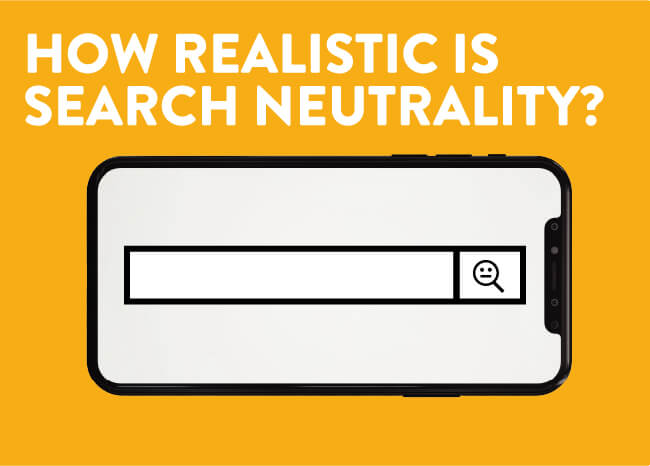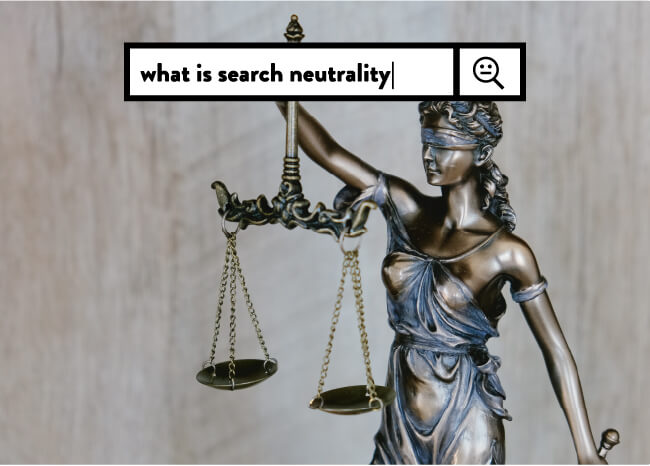[Disclaimer: This resource uses the sensitive topic of suicide. Please, reader discretion is advised.]

It is not news to any SEO marketer that understanding and catering to (as much as possible) search engine algorithms is near the core of SEO strategy. By monitoring updates and testing search engine algorithms, we can develop best practices leveraging link building and content development with a reasonable degree of success. However, there are some additional variables that may complicate the issue.
Perhaps most notable is the fact that search engines are owned by companies that have their own motivations and interests. Further, these companies do not have an obligation to full public transparency as it pertains to their indexing practices — creating the potential for bias in the search engine results pages (SERPs). Such bias could result in preferential treatment for various topics and domains when it comes to serving search results, which is a dilemma for SEO marketers and businesses alike.
As such, the subject of search neutrality is increasingly under scrutiny.
What Is Search Neutrality?

The concept of search neutrality proposes that search engines should simply serve searchers with the most relevant answer to their query, and should not interfere by applying any manual editorial processes or personalized results. While some people may labor under the delusion that this is already the case, there have been many antitrust investigations and inquiries challenging the objectivity of SERPs.
If search engines strictly adhered to the search neutrality principle, they could not block certain content from being indexed. Theoretically, banned content could be something search engines found counter to their business interests, but it could also be things like misinformation or explicit content. Similarly, they could not manually boost content in the search rankings.
Ideas and concerns related to search neutrality gained traction alongside the net neutrality debate. The name “search neutrality” was derived from the term “net neutrality” for the sake of piggybacking on the public interest for the latter. While search neutrality should theoretically benefit SEO marketers as it may be expected to offer more predictable and achievable outcomes, there are a few major roadblocks to making search neutrality a reality.
The Challenges of Search Neutrality

First and foremost, it is impossible for an algorithm to be completely impartial. Algorithms are created by human developers, and they, therefore, are built to some degree on the biases of those developers. Furthermore, search engine algorithms are built to cater to the anticipated needs and preferences of users, which requires an element of human bias as a major functional component.
Furthermore, there are significant ethical and legal concerns. From an ethical standpoint, the most common example is how the Google algorithm will serve results to a user searching for information related to suicide.
The top search results and snippets will direct the user to suicide prevention information and resources, even if this does not necessarily “answer the user’s question” or address their intent behind the search. While this measure is clearly at odds with the spirit of search neutrality, few people would likely disagree with the value of the decision.
In this case, Google has determined that they have an ethical obligation to consider the safety of the user. Such measures may further be a defensive effort against future liability lawsuits.
Finally, Google and similar companies have no legal obligation (at the time of this writing) to fully disclose their business practices as they relate to their algorithm and editorial policies.
Pros of Search Neutrality

The theoretical benefits of search neutrality include:
- More equal footing in organic search results for smaller organizations: Search results often disproportionately serve searchers with content created by larger businesses
- Greater democratization of the web: With search neutrality, web pages would be on more equal footing, which could diminish disproportionate power wielded by larger or more well-established organizations.
- Benefits to antitrust efforts: Search engines would be less capable of disproportionately promoting their business partners and subsidiaries.
- Reduction of “filter bubbles”: Users would be served results that are less catered to their specific interests, and therefore they would be less prone to insulation within like-minded communities online.
- More insightful results from A/B testing related to SEO: If search results are based on a well-defined set of rules with no exceptions, the results of various actions are more predictable.
It is important to remember, however, that many non-neutral policies are in place for good reason.
Cons of Search Neutrality

The theoretical drawbacks of search neutrality include:
- Less-relevant search results: Search results that cater to the individual user are more likely to produce satisfactory search results.
- Dangers to the safety and well-being of users: Some search results are adjusted to benefit the health and safety of users or to protect them from misinformation.
- Proliferation of misinformation: By declining to curate content, a search engine would have to allow all results an equal opportunity to rank in the search results, including harmful misinformation.
- Stagnation of search results: Established, high-ranking web pages could exponentially gain traffic and authority signals over time, effectively blocking out any opportunities for better quality pages to compete effectively with them.
- Concerns regarding intellectual property: Companies are not required to offer fine details regarding their intellectual property, and search algorithms are the intellectual property of companies like Google.
- Black hat exploitation: Increased transparency and predictability would likely allow black hat websites and marketers to exploit the algorithm more effectively. They also could not be kept in check with manual penalties.
Google’s Business Interests
Google is a massive business entity and, at least up to this point, legally does not need to disclose full details regarding its algorithm and business practices. Google has extensive business interests and partnerships, and this means that Google can theoretically utilize its widely used search engine service to promote those interests without the knowledge of the public.
Because Google rarely offers up detailed information about their algorithm, we have no way of knowing to what extent certain websites are being favored, or what information served in search results may be connected to Google’s business interests. If you are concerned about the possibility of such ulterior motives it may be helpful to keep an eye on Google’s investments and subsidiaries.
The Long-Term Outlook for Search Neutrality

There have been several significant international efforts to increase transparency within the tech industry and improve the online competitive landscape. Additionally, a major U.S.-based antitrust probe directed toward major tech companies was launched in 2019. However, little regulatory action has been taken to date in the name of search neutrality.
It is also unlikely that we will see any substantial changes on this front in the foreseeable future. Despite the problem of expanding monopolies in the tech industry and the incentive for tech giants to promote their interests through search, it is unclear whether regulatory action would be feasible or even helpful.
In the case of search neutrality concerns, there is little to be done on the part of individual SEO marketers. However, by understanding the debate, marketers can broaden their scope of understanding related to the inner workings of organic search results and related features. It is a misunderstanding to view search engine algorithms as unbiased systems with completely predictable results. However, it is also a misunderstanding to ignore the value of the adjustments that are made outright.

